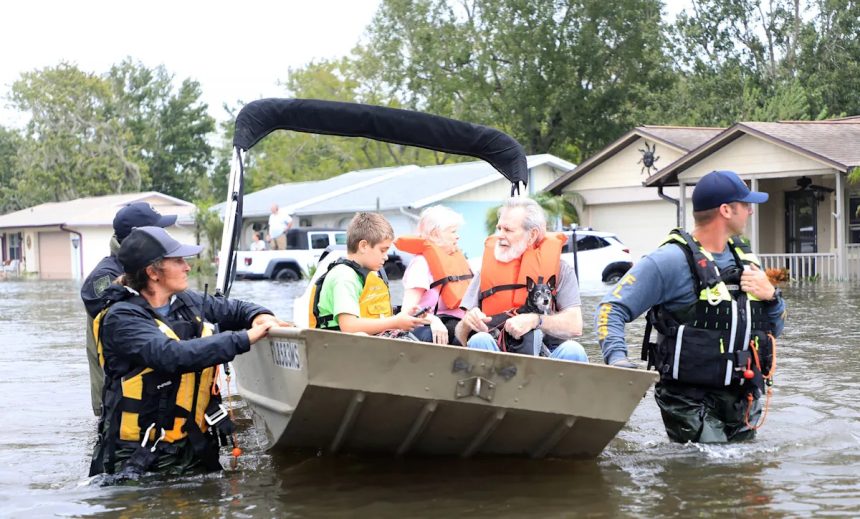It’s October, a time of year when people around the country start consuming pumpkin spice-flavored everything and making Halloween plans. In Florida, where I live – and other places along the Eastern Seaboard, I suspect – we have another seasonal rite of passage.
It involves watching weather patterns develop off the west coast of Africa and trying to figure out which of them might form into hurricanes that could lay waste to our communities.
The more conscientious of us stock up on essentials and install impact-resistant windows, while some raid the liquor stores and make attempts at gallows humor.
Yet in Florida, our state leaders have taken measures that might leave taxpayers throughout the country huffing and puffing. What our state calls storm resiliency planning requires hardworking taxpayers to pay for some of our wealthiest residents’ lifestyle choices, which often include rebuilding in hurricane-prone areas.
North Carolina Gov. Josh Stein: FEMA is broken as we brace for a new hurricane season | Opinion
Video of houses floating away in Outer Banks is perfect example
Last year was an active hurricane season, with three storms – Debby, Helene and Milton – all making landfall in the Sunshine State. Those storms, along with two others that hit other states in 2024, caused an estimated $500 billion in damage.
Florida’s legislature responded with Senate Bill 180, which was pitched as a way to make hurricane preparation, relief and recovery efforts go more smoothly.
To make it easier for owners of storm-damaged properties to rebuild, the state forbade local governments from changing their planning, zoning or building regulations in any way that would make them “more restrictive or burdensome.”
This is where Florida’s problems become burdensome for all U.S. taxpayers. Our state is encouraging more expensive development in areas where hurricanes are most likely to strike, while everyone in the country is left to foot the bill for federal disaster relief efforts.
One of five homes that collapsed within 45 minutes on Sept. 30, 2025, as rough seas from two hurricanes pounded away at beaches along portions of North Carolina’s Outer Banks.
If you saw the recent viral video of houses in the Outer Banks of North Carolina floating in storm-driven surf, you can see how this could be a problem up and down the coastline.
Florida shackled local government regulation
The Florida Legislature made its new development rules retroactive to Aug. 1, 2024, with the intent to keep them in effect until Oct. 1, 2027. The rules don’t just cover storm-damaged properties, but also any new development proposed within that window.
On Sept. 29, 25 Florida cities and counties filed a lawsuit in Leon County Circuit Court, arguing that the new law blocks local governments from using their home rule powers to determine how much growth and development their communities can support.
The lawsuit contends the state overstepped its bounds when it approved Senate Bill 180, in part because the words “restrictive” and “burdensome” are open to interpretation.
One thing’s obvious: Florida leaders want to make developers richer

Members of the Volusia County Fire Rescue Special Operations team rescue Florida residents stranded in their homes due to flooding caused by Hurricane Milton in 2024.
Mike Mortell, city manager of Stuart, Florida, one of the plaintiffs in the case, said the subtext around what’s happening is clear.
This isn’t about allowing people to restore modest bungalows built in the middle of the last century to their previous state, or even equivalents compliant with modern building codes.
State officials want condominiums, hotels and other intensive forms of development on high-priced coastal land that will increase the tax base and make developers richer.
“That’s how the State of Florida operates,” Mortell said. “They want to tear down the old and build the new.”
Opinion alerts: Get columns from your favorite columnists + expert analysis on top issues, delivered straight to your device through the USA TODAY app. Don’t have the app? Download it for free from your app store.
In the city manager’s view, there ought to be a better balance between development rights and rights of communities that would prefer to grow slowly or perhaps even not at all.
“If you’re going to restrict local government from making more restrictive laws, then property owners shouldn’t be able to expand, either,” Mortell said.
In many parts of Florida, developers weren’t having a tough time getting their projects approved before the new law went into effect. Developers have the knowledge and resources to work through government approval processes that average citizens who oppose building projects often don’t.
We all pay for coastal development
So why should anybody outside of Florida care? Well, one of the first things that happens after a major hurricane is that the governors of affected states seek assistance from the Federal Emergency Management Agency.
So, in Florida, we’ll take that federal relief money, try to build something even more expensive in the storm-battered areas, then repeat the whole process when the next storm comes along.
Opinion: Wait, Portland gets troops? What about Asheville? We’re liberal, too!
That’s how people from across the country end up paying for the reconstruction of high-priced real estate in coastal areas where it would have been advisable never to build in the first place.
It’s true that natural disasters can strike just about anywhere. When I lived in Tennessee, tornadoes were a danger. In Colorado, it was forest fires. And even the most interior parts of Florida are vulnerable to wind and flooding damage when powerful storms pass through.
That’s different, though, from not only allowing but encouraging development in the coastal areas like offshore barrier islands that are most likely to bear the brunt of storm surge and unbroken winds.
It’s been said the definition of insanity is doing the same thing over and over and expecting different results. Then again, I live in Florida, and I know our state’s reputation.
Blake Fontenay is the commentary editor for USA TODAY.
You can read diverse opinions from our USA TODAY columnists and other writers on the Opinion front page, on X, formerly Twitter, @usatodayopinion and in our Opinion newsletter.
This article originally appeared on USA TODAY: Hurricane tracking is as FL tradition as helping developers | Opinion









